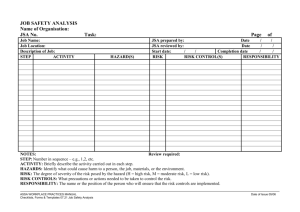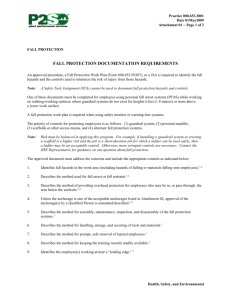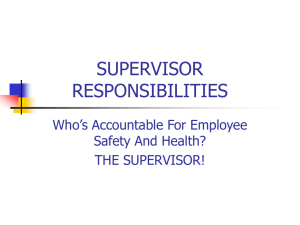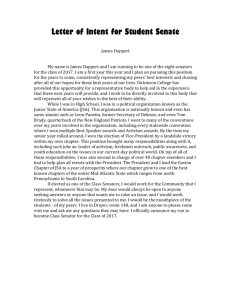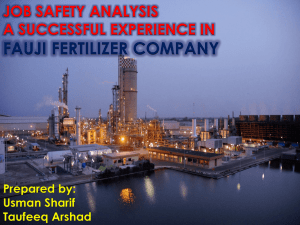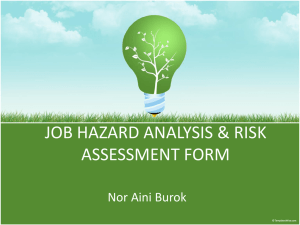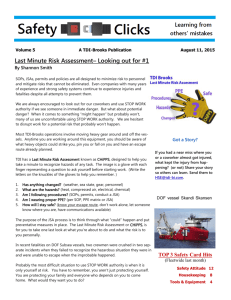job safety analysis - Puget Sound Shipbuilders Association
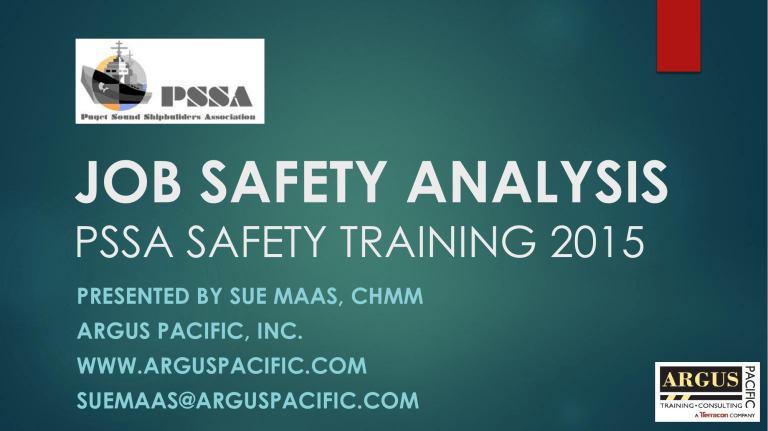
JOB SAFETY ANALYSIS
PSSA SAFETY TRAINING 2015
PRESENTED BY SUE MAAS, CHMM
ARGUS PACIFIC, INC.
WWW.ARGUSPACIFIC.COM
SUEMAAS@ARGUSPACIFIC.COM
WHAT IS A JSA?
(a.k.a. Job Hazard Analysis or Job
Risk Analysis)
A Safety version of the “7 Ps”: Prior Proper
Planning Prevents Piss Poor Performance!
Pre-examining & pre-planning a job acitivity in order to do it safely
Communication of JSA to/motivation of crew to use process
Flexible process for simple to complex jobs
Important to get management commitment
OSHA JHA (a.k.a. JSA) DEFINITION
A job hazard analysis is a technique that focuses on job tasks as a way to identify hazards before they occur
It focuses on the relationship between the worker, the task, the tools and the work environment
Ideally, after you identify uncontrolled hazards, you will take steps to eliminate or reduce them to an acceptable risk level
Not same thing as an SOP
JSAs are useful for ANY activity 24/7, such as having a safe & successful fishing adventure…
JSA MAIN PARTS
Define job: Understand tasks/steps of job & conditions at time of job
Identify/evaluate hazards of each task
Determine controls for each task hazard:
Engineering controls
Administrative controls
Work practices
PPE
LEVELS OF JSA
INFORMAL (mental or conversational; not documented)
Lower risk/more simple & routine activities
FORMAL (documented)
Higher risk/more complex activities
INFORMAL JSA
For frequent & lower risk/simple tasks
Worker(s) think/talk things through; not usually written procedures
Similar to Tool box talks/tailgate safety meetings
Job requires typically only 1-2 workers
The worker(s) doing the job perform the JSA
No approvals needed; supervisor not necessary
Worker(s) mentally/verbally outline task & estimate risk
When: just before job is done
Where: near/at location of job
Record-keeping not required
FORMAL JSA
More complex job with multiple & detailed tasks
Higher risk tasks
May be larger crew; all should have input
Documented; records kept
Supervisor oversees JSA development; approval required
More formalized risk assessment/ranking process
Conducted in advance to allow planning/creation of form
May be repeated just before job is carried out
FORMAL OR INFORMAL JSA?
Hand-carrying boxes of stores through passageways/ladderways
Painting or chipping in open air
Routine housekeeping- mopping deck
Chipping paint in an enclosed or confined space
Fueling operations
Changing air conditioner filter
Welding guardrail onto moored barge in icy conditions
Welding in enclosed or confined space
*INFORMAL
*INFORMAL
*INFORMAL
FORMAL
FORMAL
*INFORMAL
FORMAL
FORMAL
* Workers should have option of formal JSA if higher risks assessed or risks are uncertain
IF INFORMAL JSA IS ENOUGH…
What are the tasks?
Understood by all
Workers have necessary experience/comfortable w/ job
What are possible hazards?
Work area conditions, lighting, location, weather, etc
Equipment/tools to be used/condition of
People nearby affected
360: look up, down, around
Everyone gives input
IF INFORMAL JSA IS ENOUGH (Cont’d)
Who will do what?
What equipment will be used/hazard controls?
Tools/equipment
PPE
Exposure monitoring if needed
Barricades/barriers
Communication
SO, YOU NEED A FORMAL JSA…
WHAT DO YOU NEED TO KNOW?
1.
WHAT IS THE JOB (WHAT ARE TASKS)?
What specific steps/tasks make up the job?
What are the risks of each task (qualitative judgement)?
Who will perform the tasks?
Does everyone understand tasks? Need any training?
When will each task be done (time of day, weather
/environmental limitations, etc)?
What kind of tools and equipment will be needed?
What kind of communication (radios, etc) will be needed?
FORMAL JSA:
2.
WHAT ARE THE HAZARDS FOR EACH TASK?
Types of hazards:
Exposures (chemicals, gases, noise, UV, radiation, etc)
Slips, trips, falls
Electrical
Struck-by/caught-between
Heavy equipment
Cuts
Sprains/strains
Biological
Environmental (heat and cold, visibility)
Other jobs/activities nearby that affect workers/tasks
What are the risks of each task?
Rank the risks
Do any tasks need their own
JSA??
SAMPLE TASKS & HAZARDS
RANKING RISKS OF EACH HAZARD
2. Evaluate each hazard’s risk
Qualitative judgement, for example:
Severe
High
Moderate
Low
Re-assess rankings after controls selected
FORMAL JSA
3.
HOW WILL THE HAZARDS BE CONTROLLED?
Engineering controls: focus on managing hazard at the source:
Can it be eliminated?
Isolate
Contain
Ventilate
Is equipment available & in good condition?
Does everyone know how to use equipment?
Does the engineering control present its own hazards?
IMPORTANT: double-check each control’s effectiveness after implementation – JSA is on-going
FORMAL JSA
3.
HOW WILL THE HAZARDS BE CONTROLLED?
(Cont’d)
Administrative controls: focus on managing people
Policies & procedures
Training
Scheduling
Work zones
Communication system
Do you have enough people?
Do they all understand the work and any hazards?
Is everyone ready to do job (physically & mentally)?
FORMAL JSA
3.
HOW WILL THE HAZARDS BE CONTROLLED?
(Cont’d)
Work practices: tools and techniques to deal with hazard
What tools are needed?
What hazards are created by tools/activity?
Are there alternative methods/tools that are safer?
FORMAL JSA
3.
HOW WILL THE HAZARDS BE CONTROLLED?
(Cont’d)
PPE: personal protective equipment to protect against exposure to hazard:
Head
Eyes
Hearing
Respiratory
Hands
Feet
Body
FORMAL JSA
Once controls are implemented, does everything work the way it should?
Do the controls reduce the risk to the acceptable level (ranking)?
Does this job REALLY need to be done?
Have workers/supervisors involved sign their part of form
JSA documentation supports development of
SOPs
JSA FOR HOT WORK WITH LEAD PAINT
Tasks/steps
Hazards
Controls
JSA FOR HOT WORK WITH LEAD PAINT
Tasks/steps
Hazards
Controls
JSA FOR HOT WORK WITH LEAD PAINT
Tasks/steps
Hazards
Controls
CLOSING THOUGHTS ABOUT JSAs
JSA practice is more effective if:
Management is supportive, communicates commitment to JSA process consistently!
All affected workers are involved in the process:
‘the whole is greater than sum of parts…’
each worker has a unique perspective to contribute to
JSA’s being as complete as possible
Keeps workers engaged- directly impacts their safety
Process should be balanced between covering enough detail without being burdensome
MORE RESOURCES
OSHA JHA Publication:
https://www.osha.gov/Publications/osha3071.pdf
OSHA JHA Detailed form:
https://www.osha.gov/dte/grant_materials/fy10/sh-21009-
10/Detailed_Project_Hazard_Form.pdf
OSHA Shipyard Employment eTool
https://www.osha.gov/SLTC/etools/shipyard/standard/health_hazards.html
WA Labor & Industries JHA info: http://www.lni.wa.gov/safety/topics/atoz/jha/
ABS (American Bureau of Shipping) Job Safety Analysis For The Marine and
Offshore Industries
http://ww2.eagle.org/content/dam/eagle/rules-andguides/current/other/198_jobsafetyanalysis/jsa_gn_e.pdf
